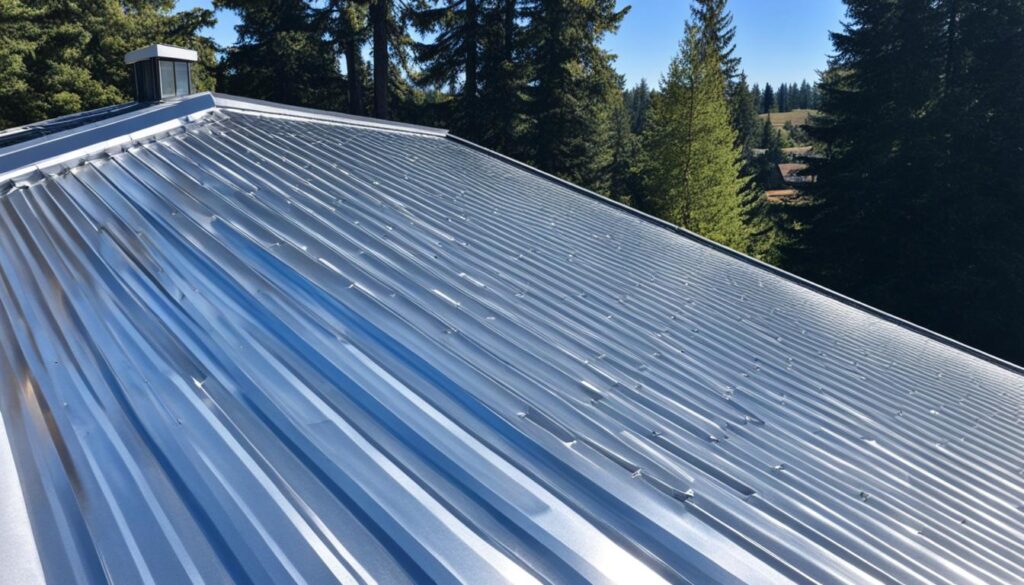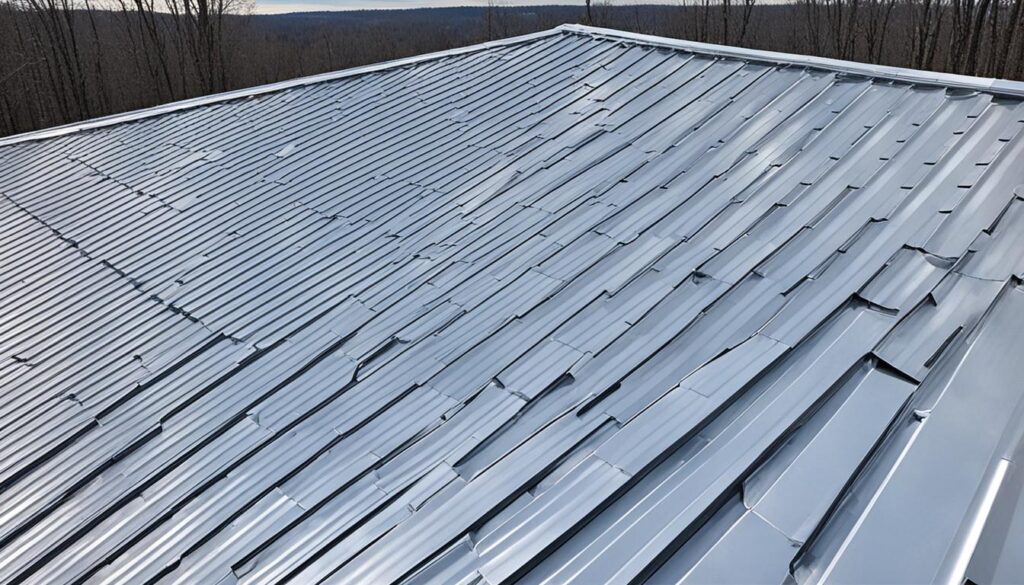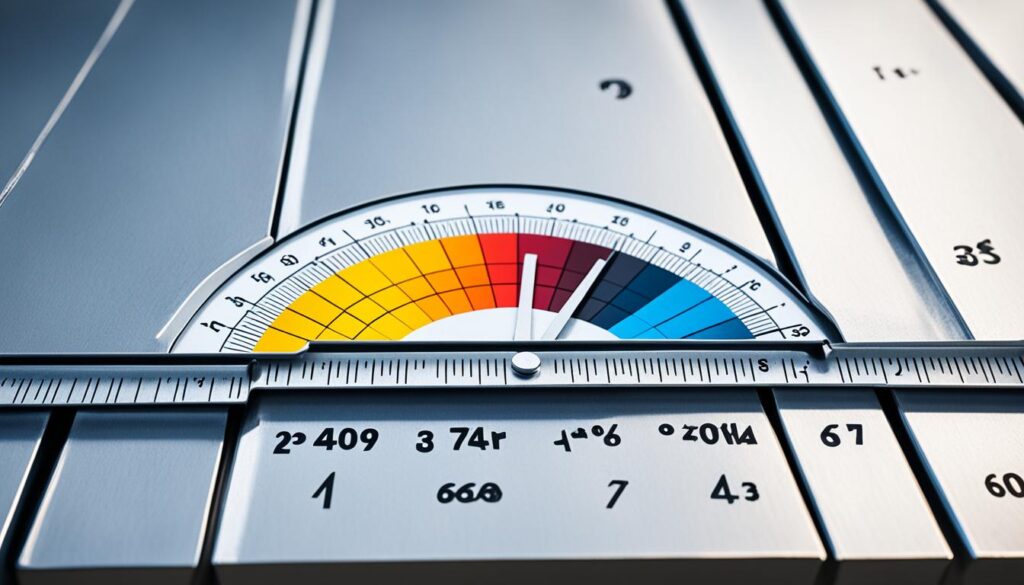Are you considering a metal roof for your home? Have you ever wondered what metal roofing gauges really mean and how they can impact your roof’s performance? Let’s shed some light on this topic and explore the different gauge sizes available for metal roofing.
When it comes to metal roofing, gauge sizes refer to the thickness of the metal panels. But why is this important? Well, the gauge of your metal roof can determine its durability, protection, and even cost. So, understanding the different gauges is key to making an informed decision for your roofing project.
But the question is, which metal roofing gauge is right for you? Does a thicker gauge always mean better quality? And what about those thinner gauges? In this article, we’ll debunk some common misconceptions and reveal the pros and cons of different metal roofing gauges. So, let’s get started!
Key Takeaways:
- Understanding metal roofing gauge sizes is crucial for selecting the right option for your needs.
- Thicker gauges offer more protection and durability but come at a higher cost.
- Thinner gauges are less expensive but may not be as durable in extreme weather conditions.
- There are four commonly used metal roofing gauges: 22, 24, 26, and 29.
- Consulting with a professional roofing contractor is essential for determining the best metal roofing gauge for your individual needs.
Pros and Cons of 22-Gauge Metal Roofing
When it comes to metal roofing, 22-gauge is the heavyweight champion. Being the thickest option available, it offers unparalleled protection and durability to safeguard your property from the elements. Whether you’re dealing with severe weather conditions or high winds, a 22-gauge metal roof can withstand it all.
With its thicker gauge, this type of metal roofing provides maximum strength and longevity. It is an excellent choice for buildings with specific construction requirements or areas prone to extreme weather, such as coastal regions.
However, there is a trade-off for its exceptional performance—the cost. 22-gauge metal roofing is typically the most expensive option available. Its thickness adds to the production and installation costs, making it more exclusive in terms of pricing.
If budget is a significant consideration and you reside in an area with milder weather conditions, alternatives like 26-gauge or 29-gauge metal roofing may be more cost-effective without compromising on quality.
“With its unmatched protection and durability, 22-gauge metal roofing is a heavyweight contender in the roofing industry. However, it comes at a premium price.”
| Pros | Cons |
|---|---|
| Maximum protection and durability | Expensive compared to thinner gauges |
| Suitable for buildings with specific construction requirements | Higher production and installation costs |
| Can withstand severe weather conditions and high winds |
Pros and Cons of 24-Gauge Metal Roofing
When it comes to metal roofing, the gauge size plays a crucial role in determining the durability and performance of the roof. In this section, we will explore the pros and cons of 24-gauge metal roofing, a popular option for homeowners seeking a balance between strength and cost.
Extreme Weather Resistance
One of the key advantages of 24-gauge metal roofing is its exceptional resistance to extreme weather conditions. Whether it’s heavy rain, strong winds, or even hailstorms, this gauge size offers the necessary strength and protection to withstand nature’s forces. Homeowners can have peace of mind knowing that their roofs are built to withstand even the harshest weather conditions.
Long-Term Appearance
Another notable benefit of 24-gauge metal roofing is its ability to maintain its appearance over the long-term. Unlike thinner gauges that may experience “oil canning,” a waviness or rippling effect, 24-gauge metal roofing provides a smoother and more visually appealing finish. This ensures that your home maintains its aesthetic appeal for years to come.
24-gauge metal roofing offers exceptional resistance to extreme weather conditions and maintains its appearance over the long-term.
Expensive Investment
While 24-gauge metal roofing comes with numerous benefits, it is crucial to consider the cost aspect. Compared to thinner gauges, 24-gauge metal roofing is generally more expensive. This is due to the higher amount of metal required to achieve its thicker gauge. However, the added protection and durability make it a worthwhile investment for homeowners who prioritize long-term performance and peace of mind.
| Pros | Cons |
|---|---|
| Exceptional resistance to extreme weather conditions | Higher cost compared to thinner gauges |
| Maintains long-term appearance |
Overall, 24-gauge metal roofing is a durable option that offers extreme weather resistance and a long-term aesthetically pleasing appearance. However, homeowners should be prepared for the higher cost associated with this gauge size. By weighing the pros and cons, individuals can make an informed decision that aligns with their budget and roofing requirements.
Pros and Cons of 26-Gauge Metal Roofing
When it comes to metal roofing, the gauge size plays a crucial role in determining the durability and cost-effectiveness of the material. In this section, we will explore the pros and cons of 26-gauge metal roofing, which is considered the industry standard for most residential and commercial applications.
| Advantages of 26-Gauge Metal Roofing | Disadvantages of 26-Gauge Metal Roofing |
|---|---|
| 1. Structural Soundness: With its thicker gauge compared to 29-gauge, 26-gauge metal roofing offers enhanced structural soundness. It can withstand the weight of snow, heavy rainfall, and other potential loads, providing long-lasting protection for your property. | 1. Vulnerability to High Winds: While 26-gauge metal roofing is durable, it may not be the ideal choice for areas with high winds. In regions prone to hurricanes and strong gusts, thicker gauges like 22 or 24 may offer better wind resistance. |
| 2. Cost-Effective: 26-gauge metal roofing strikes a balance between durability and affordability. It is less expensive than thicker gauges like 22 and 24, making it a cost-effective option for those looking to reap the benefits of metal roofing without breaking the bank. | 2. Limited Extreme Weather Durability: While 26-gauge metal roofing performs well in normal weather conditions, it may not provide the same level of durability in extreme weather scenarios. For areas with frequent hailstorms or extreme temperature fluctuations, thicker gauges may be more suitable. |
Overall, 26-gauge metal roofing offers a balance of structural soundness and cost-effectiveness, making it the industry standard for most residential and commercial applications. However, it is important to consider the specific weather conditions and location of your property before making a decision. Consulting with a professional roofer can provide valuable insights to ensure the right choice for your roofing needs.

Pros and Cons of 29-Gauge Metal Roofing
When considering metal roofing options, 29-gauge metal roofing stands out as the thinnest and least expensive choice. This makes it a popular option for residential homes seeking cost savings. However, it’s important to weigh the pros and cons before making a final decision.
One of the advantages of 29-gauge metal roofing is its affordability. Homeowners on a budget can benefit from the lower cost compared to thicker gauges. This allows for significant savings, especially for larger roofing projects.
Another benefit of 29-gauge metal roofing is that it is typically adequate for residential homes. It provides sufficient protection and durability in mild weather conditions. For homeowners living in areas with moderate weather patterns, this gauge can adequately meet their roofing needs.
However, it’s important to consider the potential drawbacks of choosing 29-gauge metal roofing. Its thinness may not provide the same level of durability as thicker gauges, especially in areas prone to extreme weather conditions. High winds, heavy snow, or hailstorms can potentially cause damage to the roof. Homeowners in regions with these weather challenges may want to consider a thicker gauge for added protection and peace of mind.
To summarize, 29-gauge metal roofing offers cost-saving benefits and is generally suitable for residential homes in mild climates. However, homeowners should carefully evaluate their weather conditions and potential risks before deciding on this thinner gauge option.
| Pros | Cons |
|---|---|
| Least expensive option | Less durable in extreme weather conditions |
| Adequate for residential homes | May not provide the same level of protection as thicker gauges |
Quote:
“29-gauge metal roofing offers a cost-effective solution for residential homes in moderate weather conditions.” – [Roofing Expert]

Conclusion
When it comes to selecting the right metal roofing gauge, homeowners need to consider various factors such as the type of building construction, location, and budget. Thicker gauges, like the 22 and 24-gauge options, offer added strength and durability, making them ideal for areas with extreme weather conditions. These gauges provide superior protection against high winds and severe weather.
On the other hand, thinner gauges, such as the 26 and 29-gauge options, are more cost-effective and can be suitable for residential homes in milder climates. While they may not offer the same level of durability as thicker gauges, they still provide adequate protection for most residential needs.
Regardless of the gauge chosen, consulting with a professional roofing contractor is essential. They have the expertise to assess the specific needs of each project and recommend the most suitable metal roofing gauge. Whether it’s metal roofing gauge, metal roofing gauges, gauge for metal roofing, metal roof gauge, metal roof gauges, roofing gauge for metal roofs, or metal roofing thickness gauge, understanding the pros and cons of each gauge size is crucial for making an informed decision and ensuring a long-lasting, reliable metal roof.

Meet William Adams, a seasoned roofing expert with over 30 years of hands-on experience in the industry. Having worked tirelessly under the scorching sun and through the fiercest storms, William brings a wealth of knowledge and expertise to the table. Hailing from the heart of the USA, he’s witnessed the evolution of roofing practices firsthand, mastering every aspect along the way. Now retired from the field, William spends his days cherishing time with his loved ones while sharing his invaluable insights through this platform. With William at the helm, you can trust that every tip, advice, and recommendation provided is backed by years of real-world experience and unwavering dedication to quality craftsmanship. Join us as we journey through the world of roofing, guided by the wisdom and passion of a true industry veteran.

